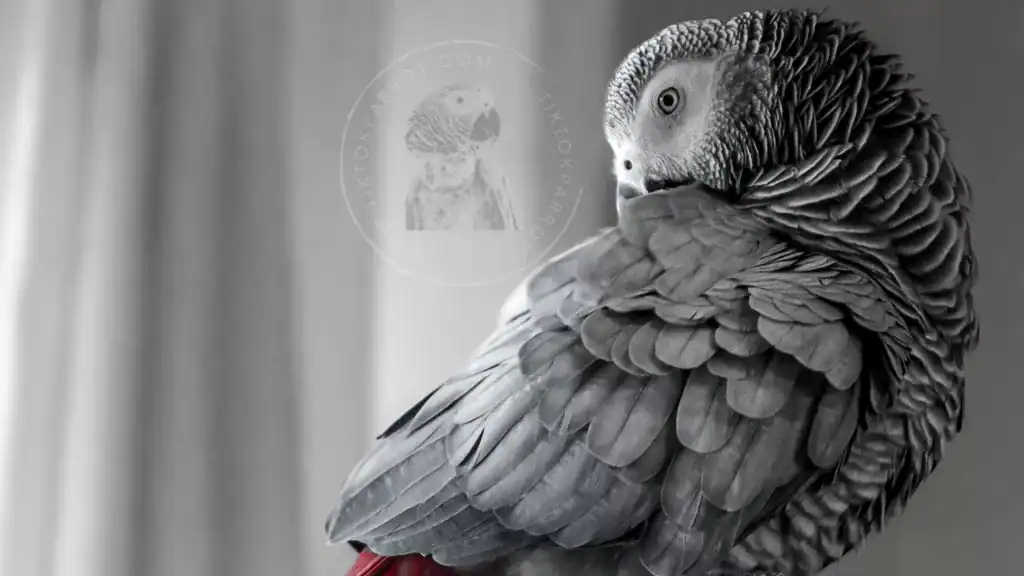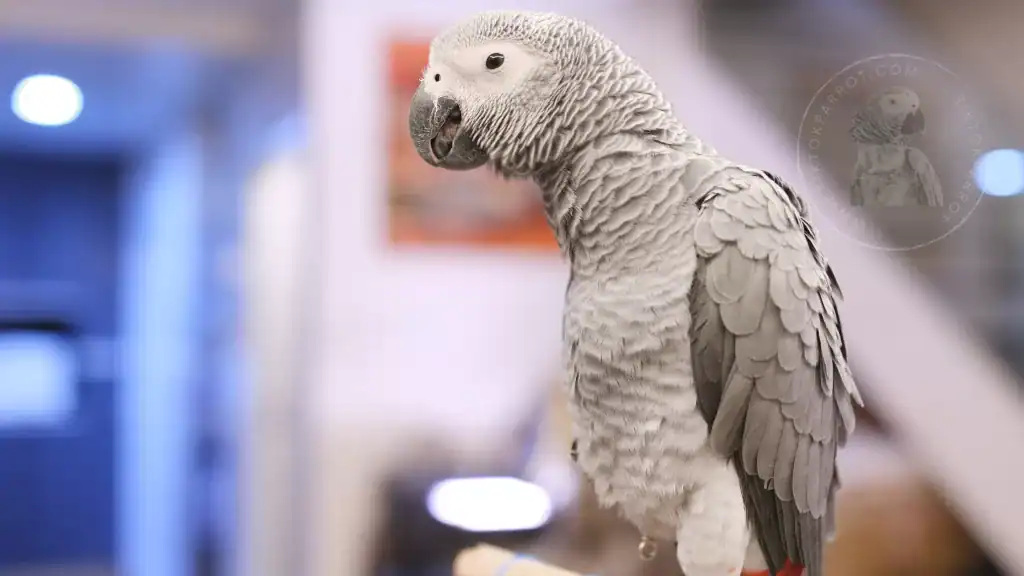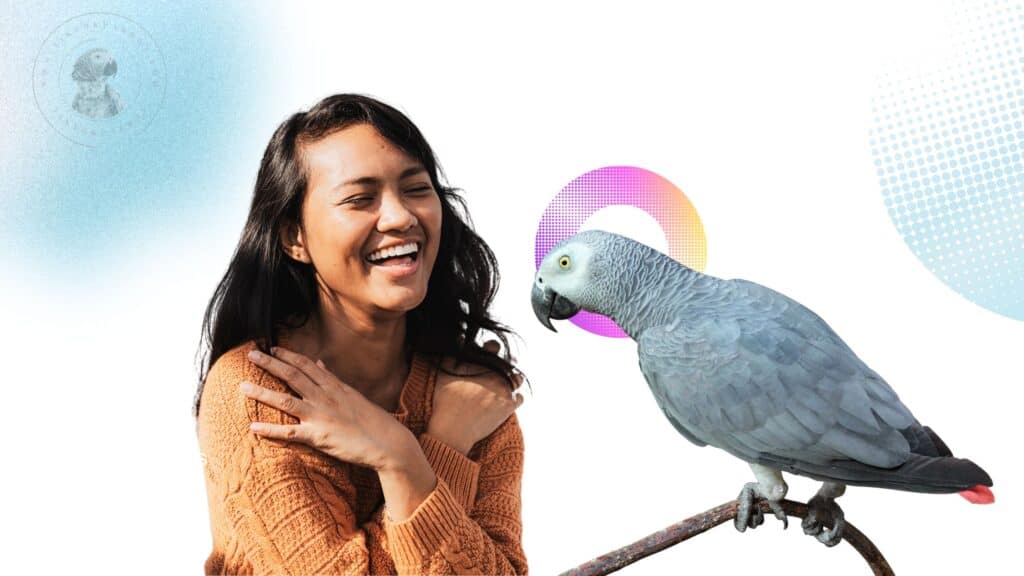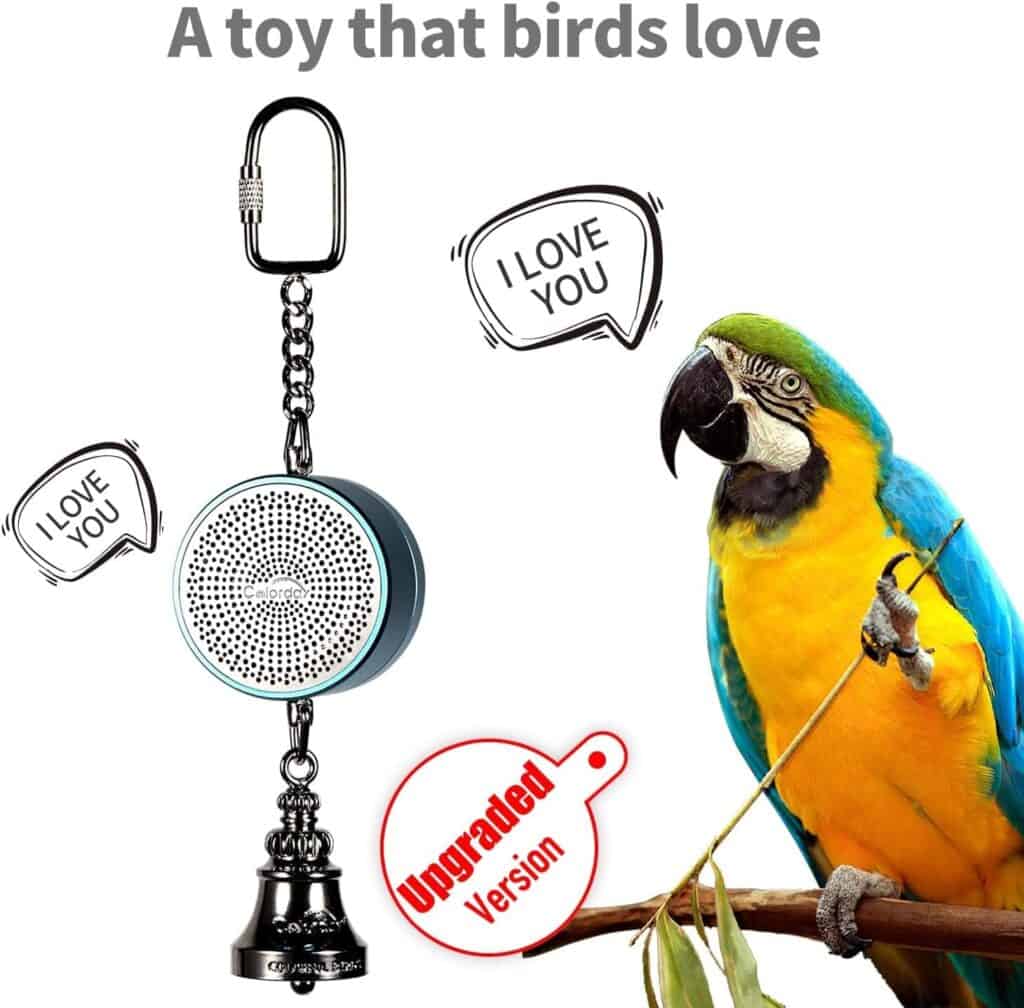A lot of people are asking me, (specially on my tiktok videos) how come my grey parrot can speak so much and learns new words so quickly.
Well, most of African Grey Parrots have an amazing talent for vocalizations. If you have one of these, you might feel eager to teach it to talk but not know how to get started. Follow my guide to learning how to teach your African Grey to vocalize and pick up words same as my parrot does. Also, in this blog, I will also share a great new tech gadget that can help you teach your parrot.

African grey parrots are known as one of the most intelligent types of birds. Since they’re not happy staying in a cage all day, it’s important to socialize them with other people. Introduce your pet to a few friends so your bird becomes comfortable around new people.
From there, you can expose your African grey to new environments. Remember that it’s also important for you to bond with your parrot. Spend time talking or playing with your African grey daily.
The below information I’m writing is from my own experience and it does not apply only for African Grey Parrots, it applies on all type of talking birds. So if you are owner of an African Grey parrot or any other talking bird, then this article is for you.
Most breeders and most bird experts contend that the African Grey parrot is the most intelligent bird in the parrot family. Studies have shown that African Grey parrots have an uncanny ability to mimic human speech. Other studies also show that African Grey parrots not only mimic sounds and human words, they also know how to use the words in the right context.
If you are a new African Grey owner and are excited about teaching your African Grey to speak, here are some useful tips that you can take. Don’t worry, the steps are easy enough for you to do and even easier for your parrot. However, be mindful that African Grey parrots start talking at about 18 months. Don’t rush a baby parrot into talking in full sentences.
Step one: Develop trust with your African Grey parrot, first and foremost. You cannot expect a parrot to learn much if he does not trust you. In the wild, African Grey parrots are considered prime meat for certain predators. You, being larger than your pet, could be considered a predator by the pet that you love. To keep him from being distrustful of you, play with him every day. This will show your pet that you do not mean any harm.
Step two: Choose a certain time each day to train your African Grey parrot to speak. This should be the time of the day when your parrot is relaxed. Don’t even attempt to teach him how to talk when he has a new toy or he is busy eating. Your efforts to teach him new words will prove worthless.
Step three: Take your African Grey parrot to a location away from his cage. The unfamiliar surroundings will make your parrot feel less familiar and could respond positively to your instruction. Also, when your parrot is in his cage, he can do what he usually does inside his cage and not focus on what you are trying to make him do.
Step four: Start teaching your African Grey parrot to say simple words. Don’t start with difficult words the first time. You can start with words that are names of things that your pet usually interacts with every day. These may include water, food, or any other favorite item of your pet. The connection that your parrot makes with the word and the actual object could make saying their names easier for your African Grey.
Step five: Armed with the chosen word for the day, prepare treats to give to your pet if he repeats the word you are trying to teach him. The reward could be his favorite food. Each time he says the desired word, reward him with the treat. This will make your parrot want to repeat the word over and over again just to get a hand on those yummy treats.
Following the above five steps in teaching your African Grey parrot to talk are surefire ways to get your pet to talk in no time! However, if your pet seems unwilling to learn, don’t get frustrated. You have more days to come with your pet parrot.
Just be patient and continue teaching him. Sooner or later, he will start speaking. Now, let’s delve deeper into these fascinating birds by exploring their strong bond with their owners and how it can influence the process of teaching a bird to talk.
Start knowing your Grey
The first step to teaching your grey to talk is to bond with your feathered friend and form reasonable expectations of it. Remember, not all African Grey’s can talk so well, some can talk a lot, some can talk a little bit and some can even just make noises without learning to talk, and even those that have the ability sometimes choose not to use it.
To determine if your grey is a good candidate for speech training, do a bit of research on your parrot. Some greys are known to be better talkers than others, so you shouldn’t expect your pet to say more than it is capable of.
Build a relationship with your grey
African Grey Parrots and many other birds that are capable of speech are social animals. It is very important to develop a relationship by speaking to them often, so that it trusts you and grows accustomed to your voice.
It is recommended to spend as much time as possible with the bird the first few months, speaking to it in gentle tones. Make sure to play with your bird often, every day. These birds in the wild have many interactions each day, and they engage with lots of stimuli. Evolved for group life, these birds like to be well-socialized. Spending lots of time with your bird will help ensure you foster a good relationship.
Plan your routine
Like training any animal, talking birds need short, frequent and regular training sessions. Make sure you build a plan such that you are able to give your bird the time and attention it needs in order to maximize its learning potential. Make a schedule. Limit training sessions to five minutes, two to five times a day. Plan to work with your bird many times a day.
Selection of Words
When it comes to teach your bird, the selection of words has an important part to begin with. The best way to encourage grey parrots to speak is to choose a few short words for them to start off with.
Examples of good starter words include “hello,” “bye-bye,” “come here,” or even your bird’s own name. Simple words, when said with enthusiasm, seem to become more interesting to most parrots.
Make sure that when you speak to your bird, you do so in a happy, positive tone. Watch your bird as you repeat the words you’ve chosen. If you pay close attention, you will probably see that some words will catch its attention more than others. Use the word that your bird responds to the most for your first “training word.”
You have to repeat the Word or Phrase as much as Possible
Once you have locked onto a word that your feathered friend is interested in, repeat the word to it as often as you possibly can. Parrots learn to mimic through repetition—so saying the word over and over again is the only way to encourage your bird to say it back.
While it’s always best for owners to teach their pets directly, some owners opt to use extra learning tools such as tape recorders and CDs to help teach their birds to talk. Using these tools can be effective, and certainly won’t hinder the training process, but owners should know that they are no substitute for one-on-one interaction, and should be used only as supplemental training aids.
Hold the grey in front of your mouth when you teach it or you get closer to him/ her
This will ensure that you have your bird’s attention. The closeness will help build the relationship between you and your bird, as well as help focus the bird on the sounds you want them to make.
Make sure your bird has fun
This is just like a child, birds benefit when learning from a sense of fun. By giving rewards, such as treats, and engaging with your bird in an excited way, it encourages the bird to enjoy this new language game. Rewards should be given immediately after the desire behavior is performed.
This helps the bird know it is doing something correct. Avoid rewarding the bird when it is not talking. This will strengthen its desire to perform. Experiment. Maybe you’re pet’s less of a hello and more of a howdy kind of bird. If your bird does respond well to what or how you’re trying to teach them, try something else.
Give your bird a variety of sounds to produce, you not only make sure they’re entertained, you stimulate their brain’s natural tendency to learn with novelty. Studies have shown that song birds learn to sing in much the same way human babies learn to talk, through babble and vocal experimentation.
Have Patience and Don’t Get Discouraged
The fastest way to encourage a bird to talk is to set up a training routine and work with it every day. Even this method, however, is not entirely guaranteed to work. While some birds pick up on human speech quite readily, some birds take months or even years to say their first word.
Some will never talk at all—even owners that work with their pets diligently sometimes end up with a bird that won’t say a word. If you feel like your bird is taking too long with his speech training, try teaching something a little bit easier, such as whistling.
Many birds find whistling much easier than mimicking speech, and some may be more willing to give it a try for this reason. With love, patience, and plenty of practice and training time, most birds that are members of the parrot family will learn to mimic something.

Don’t be sad if your parrot doesn’t talk
Pay attention to the vocalizations that your bird makes during the day. You may be surprised to find that you recognize some of them as environmental sounds that you hear every day in your home, like telephones, microwave buzzers, and doorbells. Even if your bird never speaks a human word, you shouldn’t feel slighted.
Learning capacities vary bird to bird. Some grey parrots can begin speaking after just a few months, and some take years to develop the capacity to speak.
Speech training, interaction, and socialization all help to strengthen the bond between you and your pet, so if your bird remains silent, you can still be assured that you’ll get a loveable, intelligent, and interesting companion out of the deal—and as far as owning a bird goes, that’s the best part!
Why won’t my African grey talk
There could be several reasons why an African Grey parrot may not be talking. Here are some possibilities:
- Age: African Grey parrots can take several years to start talking. If your parrot is still young, they may just need more time.
- Environment: African Grey parrots need a stimulating and social environment to encourage talking. If your parrot is not getting enough interaction, enrichment, and attention, they may be less likely to talk.
- Health issues: If your parrot is not feeling well, they may be less likely to talk. Health issues like respiratory infections, nutritional deficiencies, and other illnesses can affect a parrot’s ability to talk.
- Personality: Just like people, parrots have different personalities. Some may be more talkative than others.
- Training: African Grey parrots need consistent and patient training to learn how to talk. If you haven’t been working with your parrot regularly or using positive reinforcement techniques, they may not have learned how to talk yet.
If you are concerned about your African Grey parrot’s ability to talk, it’s a good idea to take them to an avian veterinarian for a check-up to rule out any health issues. You can also consult with a bird behaviorist or trainer to get advice on how to encourage your parrot to talk.
Now, let’s discuss the new gadget available in the market that can assist you in teaching your parrot. Your parrot will not only enjoy it as a toy but also learn how to talk while having fun with the toy.
Interactive Parrot Trainer: Colorday Bird Toys for Parakeets, African Greys, Amazons, and More!
If you found this blog helpful, It would be great if you could share it with your family and friends who might find it useful as well.
For more useful content about African Grey parrots, you can subscribe my site with your email to get notification upon publishing a new blog, the subscribe box you can see on the right side of this page. Also if you get an alert on your web browser while browsing my site, allow it and that will also give you an alert whenever I publish a new blog.
You might like reading this:
Types of African Grey Parrots
African Grey Parrot Price & Owning Cost
The Surprising Benefits of Owning an African Grey Parrot
African Grey Parrots as Pets, The Pros and Cons of Owning One
What To Do If Your Parrot Is Choking, something stuck in the throat?
Are African Grey Parrots Smarter Than Dogs?
Stay safe and much love !





